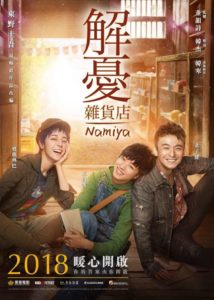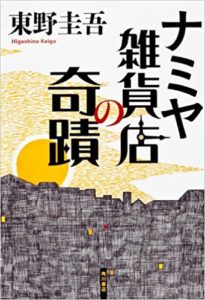Namiya
解忧杂货店
China/Hong Kong, 2017, colour, 2.35:1, 107 mins.
Director: Han Jie 韩杰.
Rating: 6/10.
Semi-fantasy heartwarmer is a smooth ride but let down by a script that’s too bitty.
Binhai, a coastal town in northern China, the present day, 31 Dec. After breaking into a woman’s house, and then their car running out of petrol, three rootless young people – Jie (Dong Zijian), tomboy Tongtong (Dilraba Dilrumat) and younger Xiaobo (Wang Junkai) – take refuge for the night in the abandoned Nameless Corner Shop 无名杂货店. As the clock strikes midnight, they find a wall calendar with the date 31 Dec 1993, and a note drops through the letterbox from someone asking for advice on whether to pursue his dream to be a professional musician. (In the old days, the shop’s aged owner, Papa Namiya, used to be an amateur agony uncle.) As a joke, the kids write a reply but then immediately receive a follow-up note. They realise that somehow time has become condensed within the shop and that the milkbox in the rear is some kind of access to a time portal. While out buying some snacks, Jie then receives a phone message that the shop is opening again, from midight to sunrise. Small Town Musician 小城音乐人. In 1993, wannabe musician Qin Lang (Li Hongqi) writes a note to the shop, describing how he struggled for three years in Beijing before being called home as his father (Cheng Taishen) was ill and wanted him to take over his factory job. He asks for Namiya’s advice and gets a  reply from the kids in the future. After becoming a success, especially with his song Reborn 重生, he takes a liking to Binhai’s Rainbow House orphanage and saves one girl, Zhang Weiwei (Li Yundi), during a fire. Decades later, she becomes a successful singer (Meng Huiyuan) with the same song. Papa Namiya and Mr. Jackson 解忧爷爷和杰克逊先生. In the early 1990s, Namiya has a correspondence with Lin Haobo (Dong Li Wuyou), the young son of an indebted businessman who’s a big fan of US singer Michael Jackson. When his parents die in a car crash while fleeing from loan sharks, Lin Haobo is taken in by Rainbow House and renamed Zhang Mo. Thinking his advice only brings bad luck, Namiya closes the corner shop and goes to live with relatives. Twenty-five years later Zhang Mo (Qin Hao), now a successful painter, learns the truth of his parents’ death. The Lost Wangwang 迷途的汪汪. While the three kids talk about their futures, a note arrives in the letterbox from Jie’s mother, Wangwang (Chen Duling). She’s 19, works as a dance-girl in a club, has a wealthy Hong Kong gangster admirer (Ji Huanbo), and also helps out at Rainbow House. From the present day Jie gives her advice, which helps her become a successful businesswoman (Hao Lei) in the present day – and has implications for the future of Rainbow House and also of the three kids.
reply from the kids in the future. After becoming a success, especially with his song Reborn 重生, he takes a liking to Binhai’s Rainbow House orphanage and saves one girl, Zhang Weiwei (Li Yundi), during a fire. Decades later, she becomes a successful singer (Meng Huiyuan) with the same song. Papa Namiya and Mr. Jackson 解忧爷爷和杰克逊先生. In the early 1990s, Namiya has a correspondence with Lin Haobo (Dong Li Wuyou), the young son of an indebted businessman who’s a big fan of US singer Michael Jackson. When his parents die in a car crash while fleeing from loan sharks, Lin Haobo is taken in by Rainbow House and renamed Zhang Mo. Thinking his advice only brings bad luck, Namiya closes the corner shop and goes to live with relatives. Twenty-five years later Zhang Mo (Qin Hao), now a successful painter, learns the truth of his parents’ death. The Lost Wangwang 迷途的汪汪. While the three kids talk about their futures, a note arrives in the letterbox from Jie’s mother, Wangwang (Chen Duling). She’s 19, works as a dance-girl in a club, has a wealthy Hong Kong gangster admirer (Ji Huanbo), and also helps out at Rainbow House. From the present day Jie gives her advice, which helps her become a successful businesswoman (Hao Lei) in the present day – and has implications for the future of Rainbow House and also of the three kids.
REVIEW
Three street kids stumble on a time portal in an abandoned shop one night and start corresponding through time in Namiya 解忧杂货店, a simple heart-warmer that presses all the right buttons on family, orphans and New China’s economic success. The idea of a celestial post office was flirted with most recently in glossy student weepie Crying Out in Love 在世界中心呼唤爱 (2016) and was a major plot plank of South Korean melodrama Il Mare 시월애 (2000); in Namiya it’s developed from the idea of a corner-shop owner  starting an agony-uncle service, and is developed to unite three separate stories across a quarter of a century. If the whole thing has a very whimsical, Japanese feel that’s because it’s adapted from a novel (see above left) by mystery writer Higashino Keigo 东野圭吾 that sold well in Chinese translation. Mainland box office was a solid but unspectacular RMB224 million. A local adaptation, directed by Hiroki Ryuichi 广木 隆一 (Kabukicho Love Hotel さよなら歌舞伎町, 2014) and with veteran Nishida Toshiyuki 西田敏行 as the old shop owner, was released in Sep 2017 (see below left).
starting an agony-uncle service, and is developed to unite three separate stories across a quarter of a century. If the whole thing has a very whimsical, Japanese feel that’s because it’s adapted from a novel (see above left) by mystery writer Higashino Keigo 东野圭吾 that sold well in Chinese translation. Mainland box office was a solid but unspectacular RMB224 million. A local adaptation, directed by Hiroki Ryuichi 广木 隆一 (Kabukicho Love Hotel さよなら歌舞伎町, 2014) and with veteran Nishida Toshiyuki 西田敏行 as the old shop owner, was released in Sep 2017 (see below left).
Higashino’s large following in the Mainland has already resulted in crime mystery The Devotion of Suspect X 嫌疑人X的献身 (2017), a fairly successful adaptation of his 2005 novel 容疑者Xの献身 that performed well on release  (RMB392 million). Namiya is taken from his 2012 novel Miracles of the Namiya General Store ナミヤ杂货店の奇迹 and incongruously preserves the Japanese name of the shop in the film’s English title and subtitles. In Chinese, the shop is called Wu Ming 无名 (literally, “Nameless”) and the old owner who starts the agony-uncle service is nicknamed Jieyou Yeye 解忧爷爷 (“Grandpa Solving-Worries”).
(RMB392 million). Namiya is taken from his 2012 novel Miracles of the Namiya General Store ナミヤ杂货店の奇迹 and incongruously preserves the Japanese name of the shop in the film’s English title and subtitles. In Chinese, the shop is called Wu Ming 无名 (literally, “Nameless”) and the old owner who starts the agony-uncle service is nicknamed Jieyou Yeye 解忧爷爷 (“Grandpa Solving-Worries”).
Though he takes pains not to hijack the movie – 14th billed, not dominating the Mainland poster, not even appearing on the Hong Kong one – Cheng Long 成龙 [Jackie Chan] adopts the kind of low-key profile and heavy make-up that immediately draws attention to itself, bumbling around in glasses, beret and white hair as the kindly old man who helps solve locals’ problems by posting replies to anonymous letters on a bulletin board outside his shop. Though he even gets his own teasing introduction before he’s seen full face, Cheng thankfully doesn’t unbalance the film, not even appearing until some 40 minutes in and thereafter absent for long stretches.
In a large ensemble cast, the dramatic burden is spread widely – too widely, one could argue, with no clear protagonists – and initially kicks off with three street kids played by Mainland boybander Wang Junkai 王俊凯, 18 – in his first leading role, as the baby of the group – 25-year-old Uyghur actress Dilraba Dilmurat 迪丽热巴 (Mr Pride and Miss Prejudice 傲娇与偏见, 2016) – as the tomboy of the trio – and young actor Dong Zijian 董子健, 24, as their de facto leader. Like much else in the film, it’s only much later that we learn about them in detail – exactly who they are and what they were doing trashing a woman’s flat at the start. In the meantime they function as a device to set the story on its way, hiding out in an abandoned old shop that was closed back in 31 Dec 1993 and discovering by chance that it’s now functioning, for just a few hours, as a time portal-cum-post office. Of the three, Dong (Young Love Lost 少年巴比伦, 2013; Duckweed 乘风破浪, 2017) makes the most impact with a character who has a direct connection to one story. Dong is slowly building a solid body of work and is more forceful here than usual, though none of the three are given much to work with. (Dilmurat’s tomboy wants to be a singer, but that’s about it, which is a waste of this lively actress’ talents.)
The actors in the separate stories fare a little better, with Taiwan’s Li Hongqi 李鸿其 (the wacko drummer in City of Rock 缝纫机乐队, 2017) here playing a wannabe musician in early 1990s Beijing, and in the second story the experienced Qin Hao 秦昊 making the most of a small part as a well-known painter learning the truth of his parents’ long-ago death. The third and final story is the weakest, an over-obvious advertisement for China’s economic success and well-meaning philanthropy (with a barnstorming performance by actress Hao Lei 郝蕾 as a self-made exec), though it does cleverly complete the whole story-circle as the various threads come together. After all, as the warm, embracing score (and catchy song Reborn 重生) by Chinese American composer Wang Zongxian 王宗贤 [Nathan Wang] has been telling us from the start, Namiya is basically a feel-good semi-fantasy that only sees the best in everybody, especially when an orphanage is at stake.
It’s even more of a surprise, therefore, to see the name of Shandong-born Han Jie 韩杰, 40, as director. Namiya is only the third feature by this onetime associate of Jia Zhangke 贾樟柯, after the delinquent-youth drama Walking on the Wild Side 赖小子 (2006) and black rural comedy Mr. Tree Hello! 树先生 (2011). But Han delivers a smooth, good-looking product without any artiness – and one that would have merited an extra point if the script (already by nine hands, including veteran Hong Kong producer Li Yabo 利雅博 [Albert Lee]) had been a little less bitty.
Location shooting was around Qingdao, northern China.
CREDITS
Presented by Wanda Media (CN), Emperor Film Production (HK). Produced by Haining Sunshine Films (CN), Pebble Stone Production (HK).
Script: Song Xiao, Sun Siyu, Zhu Siyi, Han Jie. Adaptation: Lu Lei, Dong Yunshi, Ma Fangbing, Li Yabo [Albert Lee], Yin Hongbo. Photography: Li Zhihua. Editing: Kuang Zhiliang, Huang Qiongyi. Music: Wang Zongxian [Nathan Wong]. Song music (Reborn): Wang Zongxian [Nathan Wong]. Lyrics: Han Han. Vocal: Liu Ming. Production design: Li Jianwei. Styling: Wang Tao. Sound: Wu Yue, Zhuang Danrong. Artistic advice: Han Han.
Cast: Wang Junkai (Xiaobo), Dilraba Dilmurat (Tongtong), Li Hongqi (Qin Lang), Qin Hao (adult Lin Haobo/Zhang Mo), Dong Li Wuyou (young Lin Haobo), Pan Binlong (Hua Zi), Li Yundi (young Zhang Weiwei), Cheng Taishen (Qin Lang’s father), Yan Xiaopin (Qin Lang’s mother), Gao Huayang (Zhang Yi, Rainbow House administrator), Hao Lei (adult Zhang Qingmei), Chen Duling (young Zhang Qingmei/Xiaomei/Wangwang), Dong Zijian (Jie), Cheng Long [Jackie Chan] (Jieyou/Papa Namiya), Meng Huiyuan (adult Zhang Weiwei), Li Meng (Qin Tian), Ji Huanbo (Su/Zhang Long, Wangwang’s Hong Kong gangster admirer), Zhao Peilin (Lin Haobo’s mother), Xing Jiadong (Xiaojun), Wang Xiao (Xiaowang, policeman), Yang Qiyu (Yang, loan shark).
Release: China, 29 Dec 2017; Hong Kong, 18 Jan 2018.
